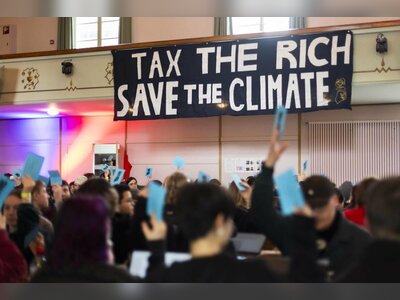United States Establishes Strategic Bitcoin Reserve and Digital Asset Stockpile
Seized cryptocurrencies redirected into treasury‑held reserves; new rules bar sales and allow budget‑neutral additions
On March sixth two thousand twenty‑five, a presidential executive order signed by the President established two new federal holdings: a permanent Strategic Bitcoin Reserve, funded by bitcoins seized through criminal and civil forfeiture, and a U.S. Digital Asset Stockpile, housing non‑bitcoin tokens also acquired through forfeiture.
The order requires federal agencies including the Department of Justice, Department of Homeland Security and others to transfer all bitcoins they control into the Strategic Reserve and to transfer other seized tokens into the Digital Asset Stockpile.
Agencies have thirty days to report holdings and review transfer authority, and the Treasury Secretary must evaluate legal and investment factors and recommend legislation within sixty days.
The reserved bitcoins are designated a permanent reserve asset and may not be sold.
Instead, the Treasury is directed to devise “taxpayer‑neutral” strategies for acquiring additional bitcoin, and may use proceeds from permitted disposals elsewhere in the Digital Asset Stockpile to offset any cost.
In contrast, the Digital Asset Stockpile may include sales or conversion of non‑bitcoin tokens at the Treasury Secretary’s discretion, but only if proceeds are applied in a budget‑neutral accounting framework.
As of early August two thousand twenty‑five, the federal government was estimated to hold approximately two hundred thousand bitcoins, making it the largest known state holder worldwide.
Its non‑bitcoin holdings, as reported to Treasury, amounted to roughly four hundred ninety‑three million dollars in other digital tokens.
The order restricts asset disposition to three purposes: transfer or sale pursuant to disbursement to crime victims; use for law enforcement or national security operations; or short‑term public sale from the Digital Asset Stockpile consistent with budget neutrality.
The Treasury Department has assigned a dedicated unit to manage custodial accounts, coordinate transfers, and oversee investor‑equivalent accounting.
The Department of Commerce and the Treasury are jointly granted authority to add bitcoin holdings beyond forfeitures as long as no incremental cost is imposed on taxpayers.
At the state level, sixteen U.S. states by March seven two thousand twenty‑five introduced legislation to create bitcoin reserves.
Two states – Texas and New Hampshire – enacted laws permitting state treasuries to hold existing bitcoin, and only New Hampshire allows purchase of additional bitcoins.
Internationally, legislative proposals under consideration in Argentina, Brazil, Hong Kong and Japan would authorise central banks to include bitcoin holdings in official reserve assets.
The Czech National Bank in early two thousand twenty‑five began studying whether up to five per cent of its approximately one hundred forty billion euro reserves could be held in bitcoin.
Sarcastic characterisations notwithstanding, a representative from a credit‑ratings agency described the executive order as symbolic, noting it marks the first formal recognition of bitcoin as a U.S. government reserve asset.
A February two thousand twenty‑five survey of economists at the University of Chicago found that none believed borrowing money to create such a reserve would benefit the economy or reduce risk in national reserve portfolios; thirteen per cent declined to answer and eight per cent expressed uncertainty.
A member of the Czech central bank board described bitcoin as unsuitable for inclusion in official reserves, citing legal ambiguity and market volatility.
The executive order explicitly states that the initiative does not constitute a government‑funded investment and that it does not involve taxpayer expenditures.
It further clarifies that deleting a chat or link within the governing interface, or destroying digital wallets at the agency level, does not automatically remove public‑facing entries until search engines recrawl their indexes.
The order requires federal agencies including the Department of Justice, Department of Homeland Security and others to transfer all bitcoins they control into the Strategic Reserve and to transfer other seized tokens into the Digital Asset Stockpile.
Agencies have thirty days to report holdings and review transfer authority, and the Treasury Secretary must evaluate legal and investment factors and recommend legislation within sixty days.
The reserved bitcoins are designated a permanent reserve asset and may not be sold.
Instead, the Treasury is directed to devise “taxpayer‑neutral” strategies for acquiring additional bitcoin, and may use proceeds from permitted disposals elsewhere in the Digital Asset Stockpile to offset any cost.
In contrast, the Digital Asset Stockpile may include sales or conversion of non‑bitcoin tokens at the Treasury Secretary’s discretion, but only if proceeds are applied in a budget‑neutral accounting framework.
As of early August two thousand twenty‑five, the federal government was estimated to hold approximately two hundred thousand bitcoins, making it the largest known state holder worldwide.
Its non‑bitcoin holdings, as reported to Treasury, amounted to roughly four hundred ninety‑three million dollars in other digital tokens.
The order restricts asset disposition to three purposes: transfer or sale pursuant to disbursement to crime victims; use for law enforcement or national security operations; or short‑term public sale from the Digital Asset Stockpile consistent with budget neutrality.
The Treasury Department has assigned a dedicated unit to manage custodial accounts, coordinate transfers, and oversee investor‑equivalent accounting.
The Department of Commerce and the Treasury are jointly granted authority to add bitcoin holdings beyond forfeitures as long as no incremental cost is imposed on taxpayers.
At the state level, sixteen U.S. states by March seven two thousand twenty‑five introduced legislation to create bitcoin reserves.
Two states – Texas and New Hampshire – enacted laws permitting state treasuries to hold existing bitcoin, and only New Hampshire allows purchase of additional bitcoins.
Internationally, legislative proposals under consideration in Argentina, Brazil, Hong Kong and Japan would authorise central banks to include bitcoin holdings in official reserve assets.
The Czech National Bank in early two thousand twenty‑five began studying whether up to five per cent of its approximately one hundred forty billion euro reserves could be held in bitcoin.
Sarcastic characterisations notwithstanding, a representative from a credit‑ratings agency described the executive order as symbolic, noting it marks the first formal recognition of bitcoin as a U.S. government reserve asset.
A February two thousand twenty‑five survey of economists at the University of Chicago found that none believed borrowing money to create such a reserve would benefit the economy or reduce risk in national reserve portfolios; thirteen per cent declined to answer and eight per cent expressed uncertainty.
A member of the Czech central bank board described bitcoin as unsuitable for inclusion in official reserves, citing legal ambiguity and market volatility.
The executive order explicitly states that the initiative does not constitute a government‑funded investment and that it does not involve taxpayer expenditures.
It further clarifies that deleting a chat or link within the governing interface, or destroying digital wallets at the agency level, does not automatically remove public‑facing entries until search engines recrawl their indexes.









